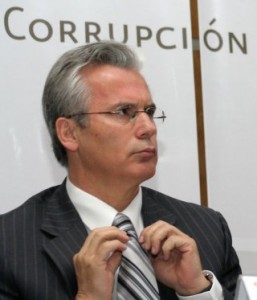
It’s another big week for Spain’s best-known judge. Today, Baltasar Garzón goes on trial to face charges of having knowingly overstepped his authority by ordering an investigation into the crimes of the Franco regime during and after the 1936-39 Civil War.
Earlier this month, Garzón faced another trial, for having allowed police to wiretap conversations between defendants in the Gürtel corruption case and their lawyers. The verdict from that case is expected any day.
Garzón is easily the most controversial figure in Spain’s judiciary and opinions on him are bitterly divided.
The High Court magistrate, now suspended from his duties, dared go where none of his colleagues would. The most controversial example of this was the Franco investigation, but there are plenty more: attempting to extradite Chile’s Augusto Pinochet from Britain in 1998; going after members of the Socialist-sponsored anti-ETA death squad GAL; pursuing the businessmen and conservative politicians involved in the Gürtel case; and jailing human rights abusers from Argentina’s own dictatorship, to name just a few cases.
According to his supporters, these cases prove how the law can and should take on the might of the powerful and corrupt. And according to his enemies, Garzón is a publicity-obsessed egomaniac, driven by personal ambition and a desire to attack the political right.
But Garzón’s own lawyer in the Franco case, Gonzalo Martínez-Fresneda, says even if the judge is vain or seeking attention, that’s not the point.
“Garzon’s personal motives, his style, his personality, are not important. If they mean he is able to tackle this problem, then that personality is a good thing,” Martínez-Fresneda told Iberosphere just days before the trial was due to begin.
For the lawyer, “this problem” is Spain’s failure to come to terms with the violence and pain of the war and the following years. This is a sensitive subject, much more so than all the other cases Garzón has pursued. Those on the right rarely broach the issue of historical memory in Spain; those on the left who do so face allegations they are needlessly raking up the past, or even seeking vengeance.
Garzón is often portrayed as a puppet of the left because of cases like Gürtel and the fact he was briefly the head of a national anti-drug program during the Socialist government of Felipe González. But Garzón soon left that post and his probe into GAL was one of the major factors in González’s removal from power in 1996. Many of his targets have been on the political right, but by no means all of them.
Garzón also has enemies on the left from his days pursuing GAL. And crucially, he seems to have made some other enemies, within the judiciary, who feel aggrieved by his insistence on hogging the limelight in taking on the big cases.
Of course, legal arguments can be found that Garzón broke the law by attempting to open the Franco-era probe, in the same way that many international experts have argued that he didn’t break the law. Similarly, the claim that he “breached the constitutional rights of defendants” seems equally open to argument.
But putting aside the details of both cases, which apparently are alarmingly open to interpretation, it’s hard to think of two affairs that lay bare so many failings of the modern Spanish state.
The slowness with which both cases have advanced, until suddenly being scheduled one on top of the other reflects the lack of dynamism of the justice system. And the fact that an investigating judge is being tried for his part in probing the Gürtel case, before many of those facing serious charges are tried, highlights the lack of vigour with which corruption from the real-estate boom has been tackled.
And while many Spaniards may prefer to leave the pain of the Franco years behind, what about those who haven’t been allowed to bury the pain, or even bury their loved ones? Defenders of the transition to democracy insist it was an effective process that meant the past could be left behind in exchange for a bright future.
But the thousands of Spaniards who are still clamouring for justice, or at least for the fate of their loved ones who were killed during those years to be clarified, suggest that the transition did not accomplish everything it set out to.
And while the case that starts today against Garzón tells us a good deal about Spain’s relationship with its past, the verdict, expected within a few days, will tell us plenty more.
Leave a Reply
You must be logged in to post a comment.